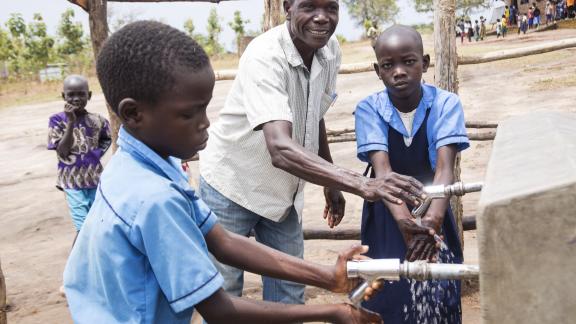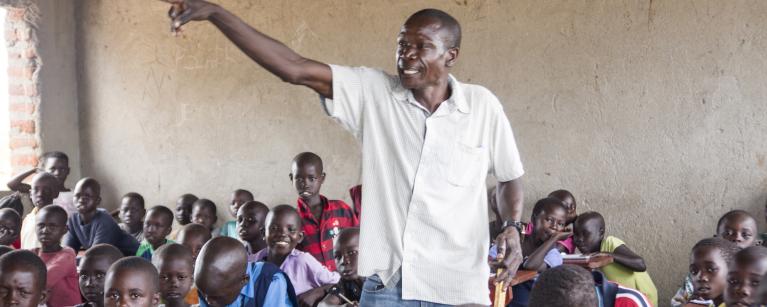When I fled the war in South Sudan in December 2016 with my family, we were settled in Ofua VI, Block C in Terego district.
I am both a farmer and a teacher. I was teaching at Dodo Sub school while in South Sudan. Currently, I am teaching mathematics and literature at Ofua VI Primary School.
Ofua VI Primary School is a community church-founded school. It was started in 2017 to extend education services to the community through providing better education for the children of the refugees and host communities but also act as a motivational centre for parents to send their children to school.
The school started with one class and it has since grown to five classes (primary one to five).
Before Oxfam, we had a serious water scarcity challenge. Our pupils had to move more than 500 meters away from the school to look for water at break and lunchtime.
This had been troubling and challenging the school and it had birthed vices such as unnecessary absenteeism by pupils. Some of them would not return to school after these breaks.
“Sometimes, some of our pupils would be knocked by speeding motorbikes, and most times, we would receive information that the community was fighting with our pupils because the water sources belonged to the community and not the school. ”
This not only caused poor performance amongst the pupils but also caused enmity between the parents of these pupils and the community members who would beat up our pupils.
In August 2023, Oxfam approached us and introduced ‘The Education in Emergence’ project. The team sensitized us on water, sanitation, and hygiene (WASH), health education, and the targets of the project.
After sensitization, the team conducted WASH assessments and established that the school lacked WASH facilities, including latrines and clean water. Oxfam committed to extending a water facility and constructing a girl’s latrine.
Oxfam has constructed one tap stand with two outlets for the school. This has not only improved the performance of the pupils but has also kept the girls in school because we have access to water for cleaning the latrines and classrooms, but also girls have enough water to use for menstrual hygiene, which is one of the major reasons for the drop-out of girls. We have also maintained the high enrolment of pupils because they have been encouraged to stay in school.

Teacher Simon Said and his pupils using the tapstands constructed by Oxfam
Because of these facilities, we plan to increase the number of classes from 5 to 6 by the end of 2024 because we expect an increase in enrollment.
Oxfam has also taught our pupils and teachers good hygiene and sanitation practices, which have been extended to the communities by our pupils.
One of the objectives of the project, we were told, is to address low enrolments in schools by providing dignified sanitary facilities such as water points and one block of latrines for the girls. This will greatly change the face of this school as it has already started to do.
While we celebrate all these developments, our school is not fenced off, and we are worried that these facilities may be shared with the community, which will overwhelm the school.
To start with, we plan to fence off the tap stand as we also plan to fence off the school premises to prevent access from outsiders and to ensure proper maintenance of our facilities.
We need to construct latrines for the boys since the girl’s latrine is already under construction, increase sensitization and training on WASH practices and emphasize the message of sending children to school.
To ensure that teachers are also considered, we plan to construct the teachers’ quarters at the school and put up at least two more classroom blocks and an office block. All this, especially the WASH facilities, has made a huge difference in our school.
The WASH in Schools Project – funded by Oxfam Hong Kong, is implemented in West Nile. The project aims to enhance community’s ability to create child-friendly school spaces, prevent and protect themselves against WASH related diseases as well enhance community participation.
The project further contributes to “Equal Opportunity to Girls’ Education (EOGE)” initiative that bringing together actors for positive change in girls’ education by challenging policy, practices, and barriers to access to education. The project is expected to reach a total 13,000 individuals (9,293 school going children/pupils in 5 schools and 3,707 persons from both refugee and host community through public health outreaches and community engagement.
